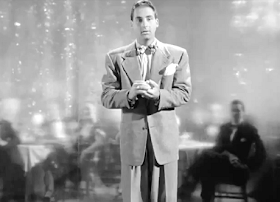"Engagingly lopsided" is how Melvyn Douglas describes Rosalind Russell when one earring goes missing in
The Guilt of Janet Ames (1947). This is also an apt description for the movie itself.
Engaging - The Actors
First, the charming part. The movie stars
Rosalind Russell - she of the quick wit, prolific Hollywood career and marvelous taste for eccentric movie roles. On what adventure is Ms. Russell taking us in the title role?
Janet Ames is a war widow who suddenly cannot walk. Her doctor says it's a psychosomatic illness; that she can walk if she chooses. What prevents her? Someone must delve into her psyche and help her discover why she'd rather not walk. Will it be the attending physician? A psychiatrist? A trusted friend? Nope. It's an alcoholic reporter that she has just met in the hospital.
The reporter is played by another engaging actor -
Melvyn Douglas - so the plot works, right? Sorta. He gets down to the root anxiety: Janet had planned to meet the five soldiers for whom her husband gave his life during the war, the men she resented. The reporter turns Svengali and encourages the lady ("cajoles" and "badgers" might be more accurate) to think of the five surviving veterans and what their families are going through.
This sets off a series of daydream sequences in which Janet interacts with people she has never met.
Kudos to the set designer, et. al. The dream sequences feel
almost like those great
Rogers and Hammerstein dream ballet numbers -
you know, where a character's entire world is reduced to its essence
with minimum set design and maximum emotion.
We are meant to be riveted by Janet's spooky dream world, and we are, until we get a full-on, confusing and senseless conversation with one of her strange, zombie-like dream people. Suddenly the audience feels trapped,weird-ed out and ready to go somewhere else.
This is the first Rosalind Russell film that I almost turned off. Maybe feeling trapped with her is the point. We experience what our protagonist feels.
Despite my discomfort with the film, I appreciate the somber atmosphere - they are taking psychological problems seriously. The tone remains steady until the third quarter. That's when stuff goes wrong...sorta.
Lopsided - The Tone
One of the veterans is a stand-up comic (played by the legendary
Sid Caesar), which gives the movie an excuse to make one of the dreams an extended parody of "psychological films." The comic stares into the camera and jokes about movies that take themselves too seriously. The jarring shift into meta jokes is meant to give the audience a breather, but you don't need one. Caesar's work here would have been fine in a different movie. However, in an intense thriller, stand-up jokes are tiresome.
From there until the end, the movie rapidly alternates on a loop between thriller, comedy, and romance, but not seamlessly blended; each tonal shift is distinct and separate from each other.
Further Problems - Dismissing the Widow
Despite delving into an interesting subject matter, despite the well-thought-out, minimalist set design, no one - and this is what really exasperates me - no one thinks to write a character who is gracious towards the widow. Everyone keeps telling Janet to get over her husband's death.
Sure, the reporter uses "tough love" to help her, still the dismissal of Janet's pain makes me want to slap someone, mostly the screenwriter. Who
is the screenwriter, anyway?
Checking the Internet Movie Database...
Lenore Coffee! No!
Not the same Lenore Coffee who weaves a beautiful and sensitive story of the aftermath of war in
Tomorrow is Forever (1946). Say it ain't so, IMDB! Say it ain't so!
Oh.
Janet Ames is merely based on one of Coffee's story ideas. It was fleshed out by three other writers. Phew! All is right with the world again... sorta.


























